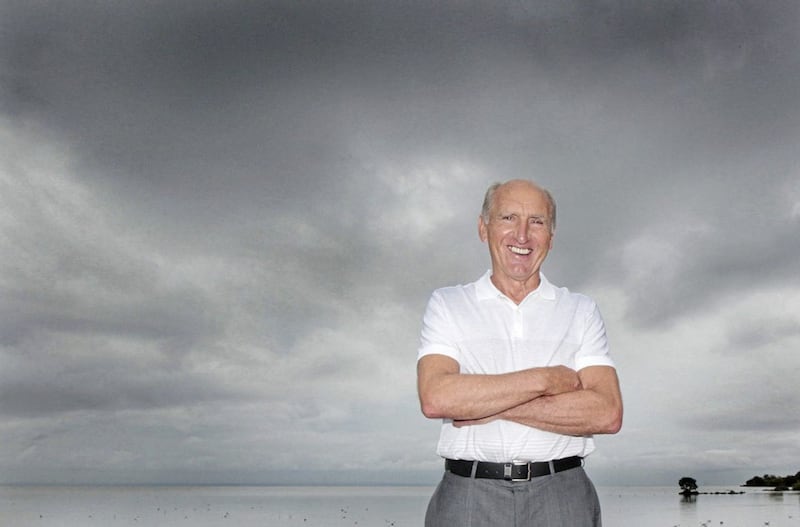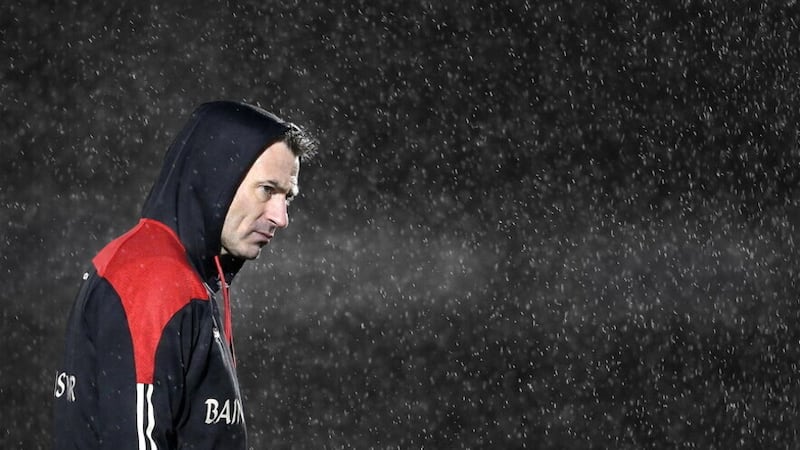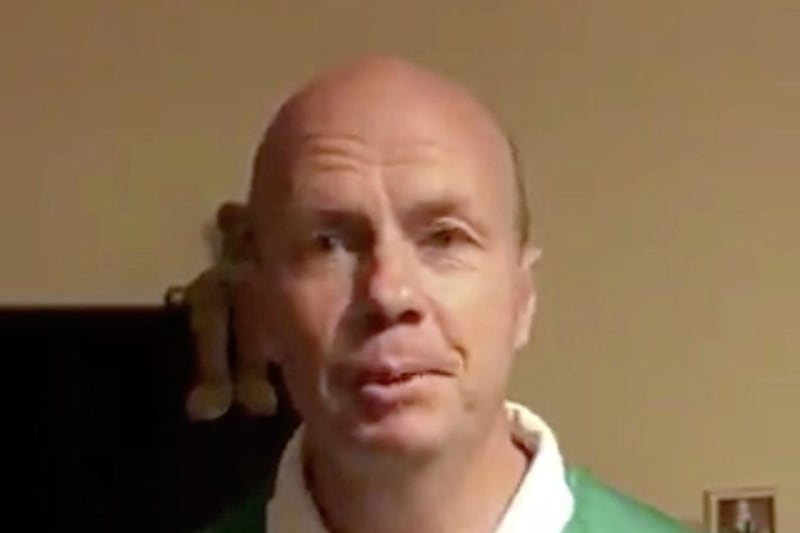In the second part of his in-depth interview with Brendan Crossan, Diarmaid Marsden looks back at some of his greatest and lowest moments of his playing career. In the words of legendary coach, Dessie Ryan, Armagh and Queen's were in the company of a genius...
DOWN never stood a chance in the ’99 Ulster final. Too many of Pete McGrath’s team were past their prime as they ran into a hugely explosive Armagh juggernaut.
Down’s muscle memory alone kept the scoreboard respectable in the early stages before Diarmaid Marsden and Oisin McConville, playing with his collars up, took complete control.
Everything the pair touched on that sunny day in Clones turned to gold.
Oisin scored a staggering 2-7 with Marsden providing much of the ammunition.
Wearing number 14, Marsden accelerated away from Finbar Caufield, his old St Colman’s team-mate, and gift-wrapped Oisin’s first of two majors.
Later in the half, Marsden shrugged Caulfield aside, caught a high ball, turned and picked his spot in the back of Down’s net.
It was mesmerising stuff from an Armagh side that had just announced their All-Ireland credentials.
Marsden was magnificent from start to finish.
To quote Aidan O’Rourke, “there were days you could do nothing with Marsden. He was just a disaster to mark.”
“In ’99, it was totally new to everyone because the last time Armagh reached an Ulster final was in 1990,” Marsden says.
“The county was mad. Everywhere you went there were orange and white flags. You’d nearly loved to have been part of that atmosphere, but you had a game to prepare for.
“I suppose that was one of the days when everything clicked, both personally and as a unit.
“It was our first Ulster since 1982. It was brilliant, absolutely brilliant. I’ve great memories of that day. Of course, ’02 would eclipse it because of the magnitude of what we did.
“From a personal perspective, I’d a decent All-Ireland final but it wasn’t at the level of the Ulster final of ’99.”
Six years earlier, Marsden was instrumental in St Colman’s claiming a MacRory and Hogan Cup double.
The trajectory of his career continued to soar as he left one of his old mentors Pete McGrath haunted by the '99 final.
“God rest John Murphy,” sighs McGrath. “The term ‘sweeper’ wasn’t really part of Gaelic football parlance but John said to me afterwards: ‘Pete, we should’ve brought somebody back to give that full-back line some protection.’
“Oisin and Diarmaid destroyed us. Finbar Caulfield was a very good footballer, but he was a bit hung out to dry that day, and I would take some responsibility for that.”
McGrath was gracious to the last. He knocked on the opposition’s changing room door and congratulated the Armagh players, many of whom he knew and had coached at school.
“It was like going into a St Colman’s changing room,” McGrath smiles wryly.
“Benny Tierney was there, Jarlath Burns was there, Paul McGrane, Diarmaid, John Rafferty, Ger Reid - all ex-Colman’s players.
“We were on the slide at that stage. I was devastated we lost but if I was going to be beaten by anyone, you’d want to be beaten by people who you’ve got great respect for.”
Approaching arguably his peak years, Marsden returned to Queen’s in 2000 to complete a Masters Degree.
A big draw to return to the Belfast university was to acquire a greater understanding of his craft through the wily Dessie Ryan – endearingly described by Aidan O’Rourke as the “Mr Miyagi” of Gaelic football.
“You’d go up to The Dub every Wednesday afternoon and every Monday night while trying to combine it with county training,” Marsden remembers.
“I was lucky enough to experience the Dessie factor. Dessie was pure passion. He was down to earth, honest, and you had that instant respect for him. He probably was a clever tactician but he wouldn’t have been throwing things up on a blackboard.
"It was very, very simple – getting the long ball in early and knowing the conditions of Sigerson, and that tactic worked for us in 2000. And we’d a great team: Cormac McAnallen, God rest him, Enda McNulty, Liam McBarron, Tom Brewster, Paddy McKeever, the list goes on…”
“My job was ridiculously easy,” Ryan insists. “There were players I would never have assumed to tell them how to play football - you would never interfere with their ability.
“A lot of people today mess up their own players. They put their input in but they don’t know that the footballer knows way beyond them.”
A Sigerson winner’s medal evaded Marsden during his first stint at Queen’s, finishing a runner-up in ’94, but six years later he went one better.
Despite suffering a groin strain 10 days out from the Sigerson weekend in Galway, the Clan an nGael clubman proved hugely influential as an impact sub.
He helped turn the semi-final against UCC in Queen’s favour in a pulsating second half and in an epic decider against UCD on a muddy pitch in Moycullen, Marsden was thrust from the bench again and was brilliant.
“Diarmaid was injured during Sigerson in 2000,” explains Ryan.
“I wouldn’t do this with any player but I’d let him decide when he wanted to come on... I remember saying to Diarmaid: ‘Diarmaid, if you feel you want to go on you tell me.’
“So about five minutes into the second half he called me over and said: ‘Dessie, I’m ready to go in.’
“It was a horrible day, pouring rain. The impact that Diarmaid had on the other players was the unspoken. When he came on he was just magic.”
*********
PAUL Grimley’s tackling drills would sicken any man. When Marsden rocked up to the grid, Aidan O’Rourke remembers his Armagh team-mates trying to edge as far away as possible from the bull-ring.
This was Marsden’s domain.
“Grimley used to sicken us with tackling drills, real high intensity stuff,” says O’Rourke. “That was alright until you walked into the square and Marsden was coming in from the other end.
“Nobody could stay with him because athletically he was such a freak. He was such an explosive athlete and he could sustain it.
“Those tackling drills lasted for maybe 30 seconds; you could maybe stay with him until 15 or 20 seconds and then he’d just f****** burn you.
“It’s a laugh when you think about it,” O’Rourke adds. “There’d be a quick water break and then Grimley would shout: ‘Right, into the grid.’ And you could see people hanging about the water to see where the f*** Marsden was. Nobody wanted to do it with McGrane or McGeeney either.
“Marsden would thrive in those situations and then you’d see him in games, he just could not be marked.”
Many men helped mould Diarmaid Marsden – but what contributed more than any inspirational team-talk or tackling drill was feeling the full emotional weight of defeat.
Success was hard-earned at St Colman’s and Clan na Gael, there was also the devastating All-Ireland minor final loss to Meath in ’92, he had to lose a Sigerson final before winning one and then there were the crushing All-Ireland semi-final blows in ’99 and 2000 and being ambushed by Galway in the inaugural All-Ireland Qualifiers in 2001.
“Every manager and every management team brings their own unique thing to developing you as a player,” Marsden notes, “whether it was Brian McAlinden and Brian Canavan developing us into a very competitive unit and understanding what county football was about, and Dessie Ryan being so passionate and clear with the way he wanted you to play and garnering that respect from every single member of the squad, or it was the simplicity of the St Colman’s coaches, Ray Morgan and Pete McGrath.
“Joe [Kernan] probably instilled that bit of belief that was maybe missing and the level of preparation that Joe went to was something we’d never seen before.
“Now, that’s not to say we couldn’t have won an All-Ireland a couple of years previous and maybe the players need to take a bit of responsibility for that.
“Across the board, even at club level, Noel O’Hagan – Barry’s father – we won a couple of championships in the early 90s. Each of those men had a passion for the game, a passion for the team they managed.”
In 2002, Armagh were mentally and physically prepared to reach the summit. Nobody was more ready than Marsden.
In key moments in the All-Ireland final, when Armagh sorely needed a break, or a turnover or a score to reel Kerry in, Marsden stood up.
“Before half-time we’d just missed a penalty and the heads had dropped after it, and then Diarmaid scored a point, a very simple point,” O’Rourke states.
“He made a difficult run, evaded a tackle and slipped it over the bar which brought it back to four points before half-time. It was a very important score. His third point in the second half was similar.
"It was at a time we were trying to close the gap and it brought us back into punching distance. Again we were under pressure, we couldn’t engineer scoring chances and he came up with a score that nobody else was going to come up with. And probably his defining contribution was the goal [in the second half].”
John McEntee took a heavy blow and Marsden swapped places with him in order to allow the Crossmaglen man some respite.
Marsden recalls: “John went to full-forward and I went to centre half-forward and I spent 10 minutes chasing Eamonn Fitzmaurice and he scored a point and I thought: ‘Jesus Christ’. Barry O’Hagan came on and I went back onto Marc O Se [at corner-forward].”
One of Armagh’s most relied upon plays was Benny Tierney aiming to land the ball to either side of the centre-forward. With McEntee out of the game, Marsden made a lung bursting run to collect the kick-out, which started the move that led to Oisin McConville’s game-breaking goal.
It was either Marsden’s instinct or his attention to detail that prompted him to know to run into the space to collect Tierney’s kick-out.
Joe Kernan remembers many team meetings where Marsden would ask his manager to run through the detail of a certain move again.
Marsden understood the importance of inches in big games.
Kernan recalls: “When you were explaining something in a room of 30 players, they’ll say: ‘Yeah, I’ve got that Joe.’ Diarmaid was always the man, if he wasn’t sure, he’d put his hand up and say: ‘Joe, run that by me again.’
“He wanted to be sure that he knew exactly what he was expected to do and he did it to perfection every time. He was so thorough in what he did.”
The following summer the defending All-Ireland champions recovered brilliantly after losing to Monaghan in their Ulster Championship opener in Clones, taking full advantage of the relatively new back door system and managed a second consecutive All-Ireland final appearance against Tyrone.
In a ragged, desperately tense decider neither rival came close to playing their best football, but the game arguably turned on Marsden’s controversial sending off in the second half after he tried to keep the in-rushing Philip Jordan out of his space with a stiff arm.
At the time, Brian White’s red card seemed harsh. Almost 17 years later, it still seems a harsh decision.
“If ever a man didn’t deserve to be sent off in an All-Ireland final it was Diarmaid Marsden. It was one of the great injustices,” says McGrath.
For Marsden, it is what it is.
“Individually, it was one of those days you just want to forget,” he says. “I got a boot on the back of the head which nobody seen and four staples and I only came on again 10 minutes into the second half.
“I scored a point and whatever happened, happened. I just have to live with it. I believe I was sent off in the wrong.”
What bugs Marsden most of all is that his marker Conor Gormley, in all probability, wouldn't have had the freedom to move to his right to stop Stevie McDonnell from grabbing an equaliser right at the death.
“Maybe Conor Gormley wouldn’t have made that block if I was still on. But that’s football. It potentially had an effect on the result.”
*********
IRONICALLY, Marsden had the red card rescinded weeks after the final. He hung around for 2004 – another year that got away from Armagh when they suffered at the hands of Fermanagh in the All-Ireland quarter-finals.
Marsden told Kernan that he was retiring from inter-county football - but big Joe told him not to announce anything for a while, probably in the hope of his star forward having a change of heart.
It dragged on until March 2005 before Marsden publicly announced he was not returning.
“You were nearly burnt out with the intensity of the county set-up,” Marsden says.
“I thought that 2004 was going to be the year to get another All-Ireland. I said at the start of that year I’d give it one more big push coming off the back of the disappointment of 2003.
“But we didn’t turn up against Fermanagh. Part of my thinking was wanting to give a couple of years to my club. It ended up Barry O’Hagan put his name forward for the manager’s job and he asked me to come in with him and we were both still playing at the time.
“I’d just announced I’d retired from Armagh and on my 30th birthday in a challenge match with the club I broke my ankle.
“I came back from the ankle injury and played a couple of club championship matches and then did my cruciate. So two really horrific injuries in the space of four months after coming out of county football,” Marsden laughs wryly.
After a two-year absence, Kernan enticed Marsden back to Armagh for one last throw of the dice in 2007.
In the interim, he’d missed out on two Ulster titles, but by the time of his surprise return, Armagh were a declining force. They lost to Donegal in Ulster up in Ballybofey and a young Derry side ambushed them in Clones in the Qualifiers.
Marsden shut the door on his inter-county career for a final time and hung his boots up altogether in 2008.
Although it might seem the case, Diarmaid Marsden hasn’t disappeared from view.
He’s still fully involved in GAA life. He’s head of community development in the Ulster Council and is managing the Clan na Gael seniors.
It’s 12 years since he stopped playing. He gets the occasional pang for his playing days – but there is always the present to tend to.
“You’d just love to go back in time for one last match with the boys, not just the county team but with other teams. But I don’t sit and think about it a lot, I’ve had my time. I was thankful for the years I did play.
“We spent 10 years in each other’s pockets. I miss that more than the football.”
Anyone who was around in the 1990s or early ‘Noughties’ will remember the ferocious fighting pride of Clan na Gael and Armagh.
He was the real deal who always turned up on the big days. A football purist whose brilliant performances will never dim with time.
“Diarmaid was a deep thinker of the game,” says Kernan. “I didn’t have to motivate him. He was a good team-mate. He was tough as nails, never shied away from a tackle and a lethal finisher with a cool head. He was a lovely, humble lad along with it.”
“He comes into mind at different times,” says Dessie Ryan. “I’ll never forget him. I didn’t have him as long as Armagh did but they were in the company of a genius. That’s what I think.”









